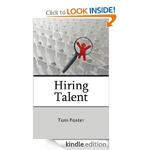“So, it’s not me, but, Joe is supposed to motivate his team?” Alicia asked.
“No, that is not Joe’s role, as a supervisor,” I replied.
“Okay, so if he is NOT supposed to motivate his team, how IS Joe supposed to get the work done?”
“Alicia, when you hired Joe to be the supervisor, how did he put his team together?”
“Well, Joe had never really hired anyone before, so I helped him screen candidates and I made recommendations.”
“And what if Joe didn’t like your recommendation?”
“Well, Joe is an adult, and he had the final say. If there was someone he didn’t want on his team, I didn’t force him,” she explained.
“So, that’s the first answer to your question of how Joe is supposed to get the work done. While you may help and qualify candidates for his team, he has the authority to veto any appointment?”
“Yes,” Alicia nodded.
“And if, in his judgment, as a Supervisor, he feels that a team member is either not doing their best or that their best is not good enough to complete assignments, does Joe have the authority to deselect that person from his team?”
“Well, yes, I mean he can’t just fire someone, we have a process for that and it requires some approvals from HR and such.”
“But Joe has the authority to deselect someone from his team?”
Alicia continued to nod. “Okay, but there has to be more,” she coaxed.
